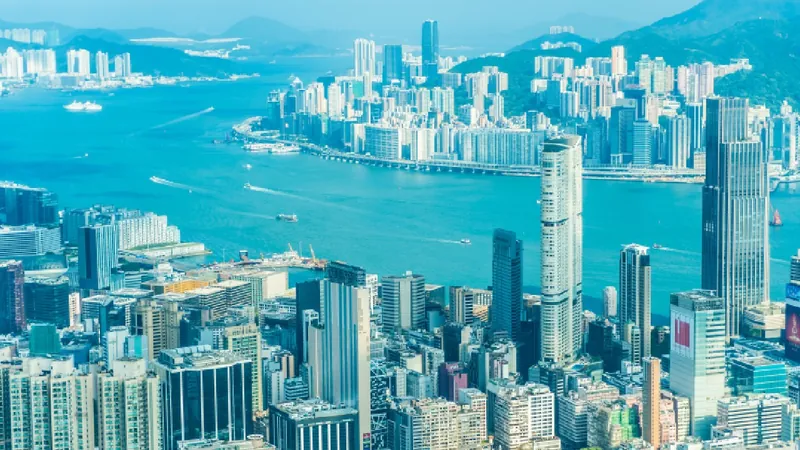
Bold Steps for a Greener Maritime Future Discussed at World Maritime Merchants Forum 2024
2024-11-25
Author: Lok
A Unified Call for Decisive Action
At the recently concluded World Maritime Merchants Forum 2024, a compelling unified call emerged for decisive action towards decarbonizing maritime transport and ensuring a just transition for the industry. The three-day forum, part of the vibrant Hong Kong Maritime Week, gathered insights from around 1,500 stakeholders, including shipping companies, ports, logistics experts, financial institutions, and legal firms. Their goal: to bolster the maritime industry's resilience and pave the way for a sustainable future.
The Importance of Shipping and its Environmental Impact
Shipping plays a crucial role in global trade, transporting approximately 90 percent of traded goods by sea. However, it is also a significant contributor to carbon emissions, responsible for about 3 percent of global greenhouse gas emissions according to the International Maritime Organization (IMO). As the pressure mounts to achieve Environmental, Social, and Governance (ESG) targets, experts warn that transitioning to alternative fuels—such as liquefied natural gas (LNG), hydrogen, ammonia, and biofuels—faces numerous hurdles, from technical compatibility to large investments.
Hong Kong's Role in Maritime Decarbonization
The forum brought attention to Hong Kong's unique position as a key trading hub with historical roots in maritime activities. However, it too is racing against time to embrace green innovations. Participants expressed hope that the discussions would illuminate how evolving global dynamics might impact the maritime sector and accelerate efforts towards the IMO’s ambitious 2050 decarbonization goal.
Calls for Innovative Solutions
Nicolas Bornozis, president of Capital Link, emphasized the need for rapid exploration of ideal green fuel alternatives to hasten fleet renewal. Hong Kong's advantageous financial and legal infrastructure can play a pivotal role in financing the transition, noted Kapil Celly from Dubai’s Sharaf Group. Furthermore, leveraging China's mature transport and logistics network could help develop multimodal transportation, significantly reducing carbon footprints.
Systemic Approach Needed
However, experts like Emanuele Grimaldi, chairman of the International Chamber of Shipping, warned that isolated regulatory measures or financial incentives won't resolve systemic issues. Instead, he stressed the need for robust economic mechanisms supporting long-term investment in low and zero-carbon technologies, improved research into alternatives, and enhanced digitalization within the maritime sector to create a sustainable global shipping ecosystem.
Hong Kong's Green Initiatives
Hong Kong is already laying the groundwork for its green ambitions. The HKSAR government has initiated the Green Incentive Scheme, reportedly the world’s first Carbon Intensity Indicator (CII)-related program, alongside last week's Action Plan on Green Maritime Fuel Bunkering. This plan aims to position Hong Kong as a premium center for green fuel, with specific goals to cut emissions from local vessels by a minimum of 11 percent by 2026 and ensure that 55 percent of diesel-powered government ships switch to greener alternatives in the same timeframe.
Industry Leaders' Vision
Industry leaders, including Edward Liu from the Hong Kong Maritime and Port Board, believe that these efforts establish a solid legal foundation for Hong Kong’s trajectory toward becoming a green maritime fuel hub. Liu highlighted the city's capability to harness its strengths as a maritime powerhouse to make green initiatives a reality.
The Collective Responsibility
Bornozis added that Hong Kong already boasts essential elements of a maritime cluster—ship management, finance, logistics, and tech—all crucial for accelerating decarbonization efforts. Meanwhile, Bud Darr from MSC Group underscored the collective responsibility of governments, industries, and NGOs to collaborate on practical, effective solutions driving the ambitious goal of achieving net-zero emissions by 2050.
A Journey Towards Sustainability
In a world increasingly concerned about climate change, this forum emphasizes a critical truth: the journey towards a sustainable maritime future requires unity, innovation, and a steadfast commitment to actionable change for generations to come.
Conclusion
Stay tuned as Hong Kong charts its course towards leading the way in the maritime industry's green revolution!

 Brasil (PT)
Brasil (PT)
 Canada (EN)
Canada (EN)
 Chile (ES)
Chile (ES)
 España (ES)
España (ES)
 France (FR)
France (FR)
 Hong Kong (EN)
Hong Kong (EN)
 Italia (IT)
Italia (IT)
 日本 (JA)
日本 (JA)
 Magyarország (HU)
Magyarország (HU)
 Norge (NO)
Norge (NO)
 Polska (PL)
Polska (PL)
 Schweiz (DE)
Schweiz (DE)
 Singapore (EN)
Singapore (EN)
 Sverige (SV)
Sverige (SV)
 Suomi (FI)
Suomi (FI)
 Türkiye (TR)
Türkiye (TR)